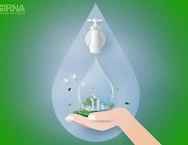Lack of safe drinking water in the capital of Afghanistan

This is really a serious matter. The lack of safe drinking water in the capital of Afghanistan shows that there are no sufficient water resources and infrastructure to meet the basic needs of the society. This problem can have a great impact on people’s health and quality of life.
To solve this problem, practical measures and effective policies are needed. Creating improved water infrastructures, providing fresh water sources, strengthening the urban irrigation and water supply network, and educating people about health and water resources management are important measures that can improve this situation.
Meanwhile, cooperation between the government and local communities, civil and international organizations is essential. Increasing public awareness about the importance of preserving water resources and its effective use can also help to solve this problem.
Why are the people of the capital suffering from a lack of drinking water?
The lack of drinking water in the capital of Afghanistan may be due to several reasons, including:
-
Lack of water infrastructure: Probably, the irrigation and water supply network in the capital is far less than the community’s needs, and therefore the water resources used to provide drinking water are insufficient.
-
Crisis of water resources: The increase in population, climate changes, decrease in rainfall and excessive use of water resources lead to the reduction of water resources.

The lack of drinking water has caused problems to the people of the capital?
Lack of drinking water in the capital can cause serious problems for people:
-
Impact on health: The lack of safe and clean drinking water can lead to waterborne diseases, including diarrhea and other diseases that are transmitted through contaminated water.
-
Decreasing the quality of life: The existence of impure water or the lack of drinking water leads to a decrease in the quality of life of people, because they resort to unsafe ways to provide their water needs.
-
Increasing costs: In the conditions of drinking water shortage, people are forced to use other sources such as bottled water or water tankers to provide water, which adds additional costs to them.
-
Impact on the economy: Water shortage can lead to a decline in the economic situation of the region, because agricultural, industrial and service resources may be affected and economic activities may decrease.
-
Impact on education and work: Water scarcity may negatively affect the education of children and youth, because they are busy to provide water for themselves and their families and away from education or work.
In general, the lack of drinking water is a serious problem that requires immediate attention and action to solve it in order to improve the quality of people’s lives.
To solve the problem of drinking water shortage in the capital, you can pay attention to the following ways:
-
Improving water infrastructure: Investing in water infrastructure including water supply network, water treatment, and creating fresh water sources such as wells and dams to provide healthy and sufficient drinking water.
-
Optimal management of water resources: Proper planning for optimal management of water resources including maintaining and improving fresh water resources, reducing losses in the water supply network, and increasing efficiency in water consumption.
-
Health Education: Teaching people about personal hygiene, correct use of water resources, and the effects of using unclean water on health.
-
Promotion of the use of tap water: encouraging the use of water sources such as tap water or refillable bottles instead of buying bottled water.
-
Development of local resources: Support for local water resources development projects such as digging wells, exploiting rainwater and purifying surface water.
-
Development of water storage culture: Encouraging the culture of water storage in homes and organizations through the implementation of educational and promotional programs.
-
Determination of effective policies: Implementation of appropriate government and city policies for managing and optimizing water resources and controlling water consumption.
-
International cooperation: Cooperation with international organizations and countries to provide assistance and support in the field of water resources management and water infrastructure development.
These solutions can provide an independent improvement to the drinking water shortage problem in the capital of Afghanistan. But it is also very important to pay attention to the local conditions and the suitability of the solutions with the real situation of the region.
